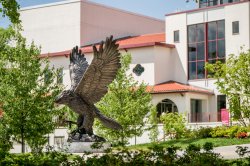One CommUNITY
At a pivotal moment, calls for social justice unite Montclair State
Posted in: Academic, Announcements, Featured News

The pandemic, protest and politics – circumstances in the world are very different than they were a year, a month and even a week ago – said speakers at One CommUNITY, a Montclair State event for social justice designed to help students make sense of issues that matter and inspire them to act to make positive change in the world.
“We have seen a myriad of issues and stressors brought to light that speak to the inequities in our society,” said Duane A. Williams, director, Center for Leadership and Engagement at the opening of the event on August 24. “So the question is, what do you do, how do you proceed, how do you make a difference, how do you succeed, and how do you remain resilient?”
Bringing students to Yogi Berra Stadium – with more than 3,000 seats there was plenty of room for social distancing – One CommUNITY included student performances and messages on social justice from a variety of angles, including the role of education as a catalyst for equity. “It is important to understand that social justice is not limited to specific individuals; rather, we all have a role,” Williams said.
“All of us have experienced and/or witnessed a series of unforgettable events that have left indelible impressions on our consciences and lives,” says Jennifer Robinson, executive director of the Center of Pedagogy. “But we are here today to declare our common unity. Rather than succumb to feelings of doubt, despair and defeat, we exercise enthusiasm, encouragement and hope in the face of adversity. In fact, it’s our mission and message to prepare future professionals who possess the knowledge, skills and dispositions to work toward a healthier, better educated and more just society.”
The programming was planned by the Center for Student Involvement and the Center for Leadership and Engagement in collaboration with the Student Government Association and the Office of Social Justice and Diversity. Speakers addressed equity issues through the lens of the media, science and education.
In the sciences, the racial disparities in health and in communities impacted by poverty cry out for students to “speak out in defense of sound science and against scientific abuses and unreasoned attacks,” said Professor of Biology Sandra Adams.
In the media, “the events of the past weeks and months and years, where we not only saw images of racial and social injustice – stories that may have remained untold in previous times – but we also witnessed new voices and protests and communities coming together to demand change,” said Keith Strudler, director of the School of Communication and Media.
In education, “At a time when educators are perhaps the most unsung of the essential workers. I hope you know and recognize that they are truly heroes and sheroes,” Robinson said.
“We’ve handed you a world that is not perfect,” added President Susan A. Cole. “We didn’t fix it. So who will? It’s you. You need to learn things, you need the knowledge base and you need to find your passion about what you really care about. And then you need to find your voice and you need to speak and you need to act.”
Associate Provost for Undergraduate Education and Dean of University College David Hood listed five things students can do to move the needle toward a more equitable campus:
- Listen and challenge your own thinking.
- Become active in the work of building a vibrant campus community that embraces differing ideas.
- Speak out constructively anytime and anywhere you see injustices.
- Make your voice heard by working with your student government to effect change.
- Increase your understanding of the terms: power, privilege, racism and white supremacy.
“Be open to understanding another person’s experience, and understanding it authentically, challenge yourself to walk in another’s shoes. That level of reflection is important for a good life,” Hood said.
With a final word, President Cole added an exclamation point to the list: Vote. “This election will define your life,” she said. “You need to vote.”
Story by Staff Writer Marilyn Joyce Lehren
You may also like:
